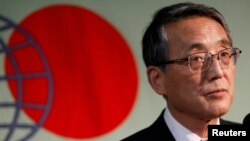TOKYO —
Japan's nuclear regulator said on Thursday that elevating safety culture to international standards will “take a long time." That assessment came days before new rules take effect that aim to avoid a repeat of the Fukushima nuclear disaster that occurred in March 2011.
An earthquake and tsunami killed nearly 20,000 people and triggered the world's worst nuclear crisis in 25 years when the Fukushima-Daiichi nuclear plant was destroyed, leaking radiation into the sea and air.
The Nuclear Regulation Authority admitted that the awareness of the dangers related to working with nuclear technology had been weak prior to the disaster, and it said that it hoped new standards would force the companies to change their approach.
“The new regulations include extremely stringent requirements that the operators would not be able to endure if they don't change their culture,” authority chairman Shunichi Tanaka told reporters. “We will need a long time to change this culture, but day-to-day efforts to meet those tough standards will in the end lead to the improvement in the safety culture.”
Trying to restart
Tokyo Electric Power Co., operator of the Fukushima plant that had three meltdowns, Kansai Electric Power Co., and three other listed nuclear operators have said they will apply for restarts after the rules go into effect.
Tanaka declined to comment on whether he considered Tokyo Electric - still struggling to contain leaks and power cuts at its ravaged plant - fit to operate nuclear facilities. He added that whether the company will be given a green light would depend on the contents of its application.
Only two of Japan's 50 reactors are running, though the decision by the previous government to start them up last year was met with the biggest protests in decades and contributed to its defeat in polls in December.
According to an Asahi newspaper poll in June, 59 percent of respondents were opposed to the new government's plans to use nuclear power to help turn the economy around.
Expensive upgrades
Without reactors running, the utilities have been forced to turn to fossil fuels instead, especially costly liquefied natural gas (LNG).
The fall in the value of the yen means they face a fuel import bill of 3.8 trillion yen this business year - double the year before the Fukushima disaster, according to a recent government study.
Upgrades required by the Nuclear Regulation Authority in its quest to impose the world's toughest earthquake and tsunami standards will cost the industry an estimated $12 billion, according to Tom O'Sullivan, an independent energy analyst based in Tokyo.
Tanaka stressed that the new regulator had what it took to impose the new regulations. “We have large authority and powers. If the operator does not comply with our regulations, they won't be able to operate, let alone restart their reactors,” he said.
An earthquake and tsunami killed nearly 20,000 people and triggered the world's worst nuclear crisis in 25 years when the Fukushima-Daiichi nuclear plant was destroyed, leaking radiation into the sea and air.
The Nuclear Regulation Authority admitted that the awareness of the dangers related to working with nuclear technology had been weak prior to the disaster, and it said that it hoped new standards would force the companies to change their approach.
“The new regulations include extremely stringent requirements that the operators would not be able to endure if they don't change their culture,” authority chairman Shunichi Tanaka told reporters. “We will need a long time to change this culture, but day-to-day efforts to meet those tough standards will in the end lead to the improvement in the safety culture.”
Trying to restart
Tokyo Electric Power Co., operator of the Fukushima plant that had three meltdowns, Kansai Electric Power Co., and three other listed nuclear operators have said they will apply for restarts after the rules go into effect.
Tanaka declined to comment on whether he considered Tokyo Electric - still struggling to contain leaks and power cuts at its ravaged plant - fit to operate nuclear facilities. He added that whether the company will be given a green light would depend on the contents of its application.
Only two of Japan's 50 reactors are running, though the decision by the previous government to start them up last year was met with the biggest protests in decades and contributed to its defeat in polls in December.
According to an Asahi newspaper poll in June, 59 percent of respondents were opposed to the new government's plans to use nuclear power to help turn the economy around.
Expensive upgrades
Without reactors running, the utilities have been forced to turn to fossil fuels instead, especially costly liquefied natural gas (LNG).
The fall in the value of the yen means they face a fuel import bill of 3.8 trillion yen this business year - double the year before the Fukushima disaster, according to a recent government study.
Upgrades required by the Nuclear Regulation Authority in its quest to impose the world's toughest earthquake and tsunami standards will cost the industry an estimated $12 billion, according to Tom O'Sullivan, an independent energy analyst based in Tokyo.
Tanaka stressed that the new regulator had what it took to impose the new regulations. “We have large authority and powers. If the operator does not comply with our regulations, they won't be able to operate, let alone restart their reactors,” he said.










